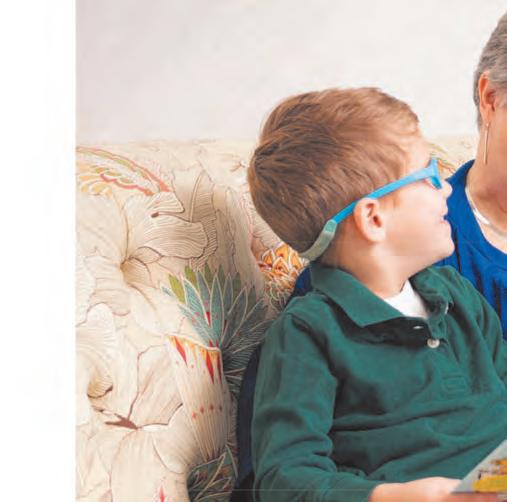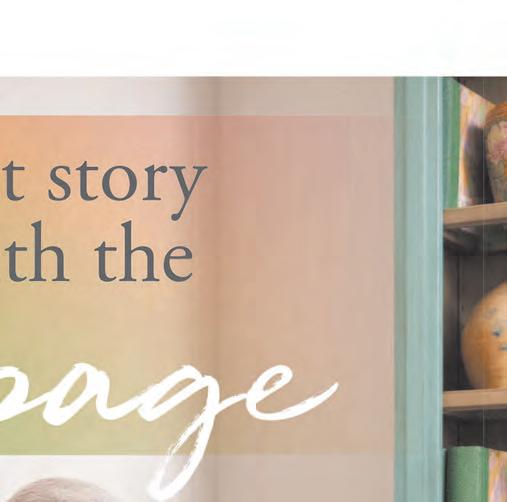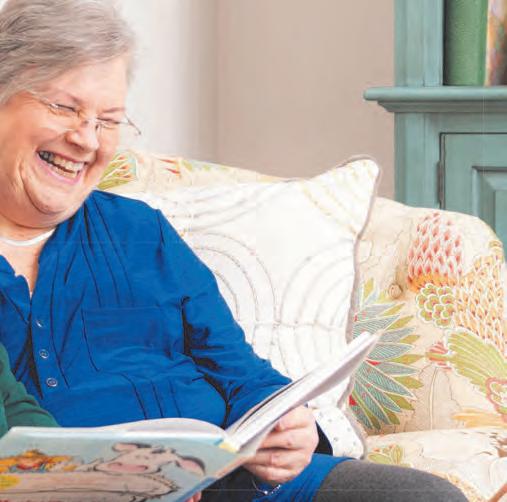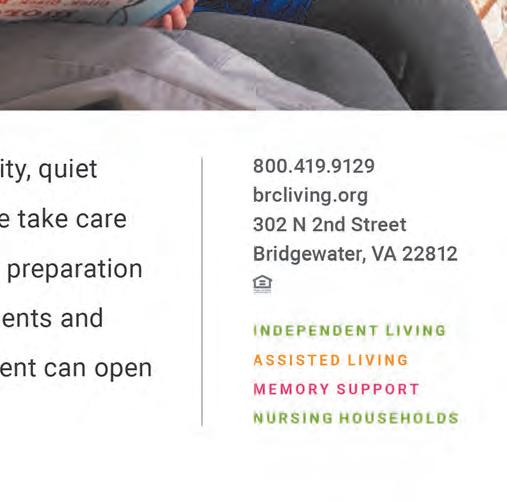Wednesday, June 4, 2025

Artists, family members, friends, volunteers and students gathered at an Opening Minds through Art (OMA) show and reception at Valley Program for Aging Services (VPAS) last month. Learn more about OMA in this issue.



Wednesday, June 4, 2025

Artists, family members, friends, volunteers and students gathered at an Opening Minds through Art (OMA) show and reception at Valley Program for Aging Services (VPAS) last month. Learn more about OMA in this issue.


By ASHLIE HEATWOLE Communications Specialist at Bridgewater Retirement Community
As temperatures rise during the summer months, it becomes increasingly important for older adults to stay cool and hydrated. Older adults are more vulnerable to heat-related illnesses, such as heat stroke and dehydration, due to physiological changes that come with aging, the presence of chronic medical conditions, and the side effects of certain medications. Understanding how to stay safe in the heat can make a significant difference in well-being during warmer weather, helping to prevent dangerous conditions and allowing older adults to enjoy summer activities safely and comfortably
Tips for staying cool and hydrated
• Drink plenty of water: Aim to drink at least eight 8-ounce glasses of water daily, and more if you’re spending time outside. Avoid alcohol and caffeinated beverages, as these can increase dehydration. Consider setting hydration reminders or using apps to ensure consistent fluid intake.
• Eat water-rich foods: Incorporate foods with high water content like watermelon, cucumbers, and leafy greens to help maintain hydration. Adding electrolyte-rich drinks, like coconut water or diluted sports drinks, can also be beneficial, especially if you’re sweating more than usual.
• Dress appropriately: Wear lightweight, light-colored, and loose-fitting clothing to help regulate body temperature. Don’t forget to use sunscreen (SPF 30 or higher), sunglasses, and a wide-brimmed hat for added protection from the sun.
• Stay indoors during peak heat hours: Try to limit outdoor activities between 10 AM and 4 PM when the sun’s rays are strongest.
• Use fans and air conditioning: Keep your living space cool with fans, air conditioning, or by visiting public spaces like malls or libraries during the hottest parts of the day. Running indoor errands during peak heat hours can also help.
• Take cool showers or baths: A quick cool shower or a damp washcloth can help bring your body temperature down.
• Monitor local weather reports: Stay informed about heat advisories and plan activities accordingly.
• Check on others: Regularly check on neighbors, friends, or family members, especially those living alone, to ensure they are safe and comfortable during heat waves.
• Emergency preparedness: Have a plan for cooling off if air conditioning fails or during prolonged heat waves. Knowing the location of nearby cooling centers can be lifesaving.
Understanding the symptoms of heat-related illnesses is critical for early intervention:
• Heat exhaustion: Symptoms include heavy sweating, weakness, dizziness, nausea, and a rapid pulse. Move to a cool place, drink water, and rest if you experience these symptoms.
• Heat stroke: This is a medical emergency. Symptoms include a high body temperature (103°F or higher), confusion, strong and rapid pulse, dry skin, and fainting. Call 911 immediately if you suspect heat stroke.
Certain medications, such as diuretics, antihistamines, and blood pressure drugs, can affect the body’s ability to stay hydrated and regulate temperature. Chronic conditions like heart disease, kidney

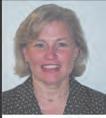


issues, and diabetes also increase vulnerability to heat. Some older adults may not feel thirsty even when dehydrated, so setting drinking reminders is essential. It’s important to talk with your healthcare provider about how medications and health conditions may affect your risk during summer.
Staying cool and hydrated during the summer is crucial for older adults. By following these tips and staying aware of the warning signs of heat-related illnesses, you can enjoy the season safely and comfortably. If you have concerns about medications or health conditions affecting your ability to stay cool, be sure to consult with your healthcare provider. Remember, a little preparation can go a long way in staying safe and comfortable during the hot summer months.
Leigh-Anne Lees, Chair Community Relations Director, Valley Program for Aging Services
Ashlie Heatwole,Communications Specialist, Bridgewater Retirement Community
Amy Homan DePoy, OT/L, Owner/Director, Cardinal Care LLC
Jeanine Maddox, Executive Assistant, Sunnyside Retirement Community
Susan Ribelin, Program Coordinator, Sentara; RMH Safe at Home and Senior Advantage
Nancy Wayland, Executive Director, Sunnyside Retirement Community
Kathleen Overfield-Zook, Director, Lifelong Learning Institute, James Madison University

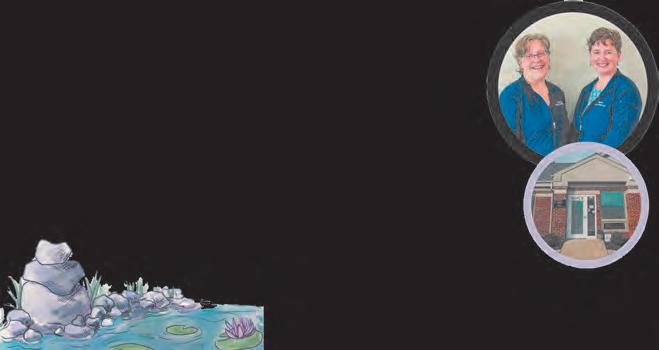

By JEANINE MADDOX
Executive Assistant, Sunnyside Retirement Community
Bobbed, pixied, layered, inverted, stacked, shoulder-length, or highlighted — there are few rules for choosing hair styles, but definitely commonalities as our hair ages with us. We interviewed our stylists at
Sunnyside Retirement Community’s Springs Salon and Spa to gather their professional perspectives on styling hair over 50.
Nicole Harden and Kim Morris have been in the business of hair for over 30 years. Our interview took place while Nancy Wayland, Sunnyside’s Executive Director, had Nicole trim her hair, chatting while



she worked (a scene straight out of any salon). Later, Nicole braided Kim’s feathery blonde hair in a simple updo. Of the four 50 to 60-somethings present, our hair was a range of thick, dyed, wavy, coarse, fine, natural gray, shoulder-length, and jaunty, which refutes the stereotype of particular looks at certain ages!
trims. Even a healthy diet impacts hair health. Supplements like biotin, collagen, vitamin C, and protein all nourish hair. Look for products specifically designed for mature or fine hair to target the benefits

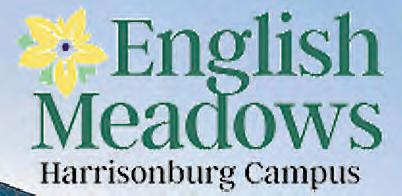
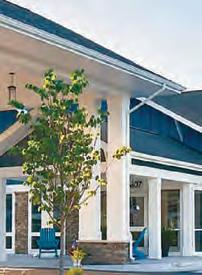

Whether you embrace your “wisdom highlights” or color away the gray, common changes occur in hair as we age. As pigment changes, hair becomes coarser; then when we add color, it may fade more quickly. Hair is also drier and thinner in the second half of life, which makes achieving lift or fullness more challenging. Some popular products include dry shampoo (mixed opinions), mousse (very versatile), and moisturizing serums (tried and true). Color, texture, and volume are all impacted by products, along with tools & heat involved in styling routines.
Our stylists have seen trends come and go; roller sets and perms of the past are giving way to simpler and even edgy cuts for senior clients. Many people stopped coloring their hair during COVID and haven’t gone back. Not only that, but think about how mobility can impact hairstyles: people may be less inclined or unable to hold their arms above their heads for the time necessary to selfstyle, whether to curl, blow-dry, or straighten. The magic of a great cut achieves a balance between a preferred style and the effort required for maintaining it.
Whatever your style, it’s important to keep hair moisturized, protect it from sun and heat, and get regular
Sunnyside’s stylists don’t differentiate in prices for men’s vs. women’s cuts; they say men are equally as particular as women. With a twinkle in her eye, Nicole said some men’s cuts might incur a “finder’s fee.” This banter is a great example of how stylists appreciate the relationships they build over time through salon visits. Nicole and Kim might host a donut party with residents in Health Care who socialize while having their hair styled or cut, which just goes to show that the enjoyment of the salon experience doesn’t have an age limit. They also offered a few fun ideas for future consideration:
• Bangs hide forehead wrinkles!
•No straight razors on wrinkly necks!
•“Fairy hair” (hair tinsel) lasts until it grows out an inch or so!
• Unconventional color streaks are fun for surprising the grandkids!
Every stylist cuts a little differently, and most would agree that you get a better cut from someone who knows your hair and preferences. You can spend considerable time browsing online for “hair styles over 50” and not find the perfect look, but a conversation with a hair professional who knows you might just lead to a new favorite! When all is said and done, every one of every age wants to feel good about their hair. After 50, know what works best to keep yours healthy and vibrant!
By VICTORIA SKINNER Student Intern from JMU Health Services Administration
“I thank God for all of them. It’s really a blessing for people like myself that need the help. Now, I’ve got my willpower back.” These words, spoken by a grateful participant in the CAPABLE program, capture the spirit of a pioneering initiative that is transforming how older adults age in place with dignity, safety, and renewed purpose.
The CAPABLE Program, short for Community Aging in Place – Advancing Better Living for Elders, is an innovative, evidence-based initiative designed to empower older adults to live independently in their own homes for as long as possible. Developed by Johns Hopkins School of Nursing, the program blends practical support with clinical care to address both environmental and health-related barriers to aging in place.
Over a period of four months, participants re-
ceive six home visits from an occupational therapist and four from a registered nurse. During these sessions, the individual identifies personal goals, whether it’s climbing stairs, cooking meals, or bathing safely, and works toward achieving them. A handyperson also visits to complete targeted home modifications like installing grab bars, repairing steps, or improving lighting. Supplies and adaptive equipment are also provided as needed to enhance daily function.
More than a set of services, CAPABLE is a philosophy rooted in self-direction. It recognizes that older adults are the experts in their own lives, capable of directing the changes they need to maintain independence.
“Everything in CAPABLE is not only client-centered; it is client-directed,” says Allyson Evelyn-Gustave, the lead occupational therapist for the program who has been involved since its inception. “It’s very tailored to what they want to work on.”
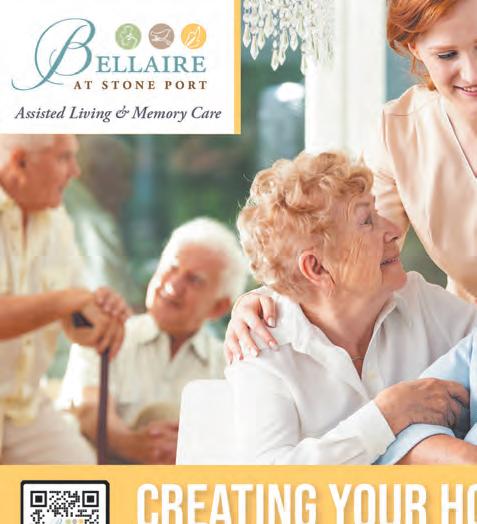


Studies show that CAPABLE significantly improves mobility, reduces hospitalization, and boosts quality of life all while being cost-effective. It also helps participants gain skills they can use long after the program ends, providing lasting impact on health and well-being. The CAPABLE model has been embraced across the country, proving that aging in place isn’t just possible, it’s powerful.
In our community, CAPABLE currently partners with Sentara Home Health, Central Valley Habitat for Humanity’s Critical Home Repair Program, Virginia Mennonite Retirement Community (VMRC), Bridgewater Retirement Community (BRC), Sunnyside Retirement Community (SRC), and Sentara RMH Senior Services to serve residents of Harrisonburg and Rockingham County.
If you are interested in learning more about CAPABLE or if you think you or a loved one could benefit from the program, please reach out to Sentara RMH Senior Services at 540-564-5165.




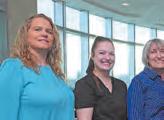

By RICK LOUDON PTA & Director of Rehab, Sunnyside
June is Alzheimer’s and Brain Awareness Month, which is a great time to review steps to reduce cognitive decline. Among these, getting good sleep, following a healthy diet, and staying active/mobile support a healthy brain and body.
Connections between sleep, diet, exercise, and Dementia are complicated, with extensive research underway and more needed to fully understand how they are interrelated. Like other health concerns, Dementia can feel a little like a chicken or egg scenario: which came first, poor diet/sleep/activity and then Dementia, or Dementia and as a result, poor diet/sleep/activity? Research will hopefully shed more light on these relationships.
In the meantime, experts from the Alzheimer’s Association have advice for strengthening our sleep, diet, and activity to support brain health as part of a wide-sweep approach to healthy living.
To get the best sleep results:
• Stay off screens before bed.
• Create a comfortable sleep space that’s free of disruptions (light, noise, irritating textures, heat or cold).
• If you experience problems with sleep, it’s not too early or too late to talk to your doctor about potential solutions.
Nutrition is another important factor for healthy aging and possibly preventing or delaying the onset of dementia and cognitive decline. Research studies have discovered that certain dietary patterns (the way we eat) have the potential to decrease the risk of developing Alzheimer’s or Dementia. The results from these studies led Dr. Martha Clare Morris and her colleagues to develop the MIND Diet (Mediterranean-DASH Intervention for Neurodegenerative
Delay).
The MIND Diet is a combination of the DASH Diet (Dietary Approaches to Stop Hypertension) and the Mediterranean Diet; it stresses consuming foods that are beneficial for good brain health such as leafy greens and vegetables; berries; extra virgin olive oil; nuts and seeds; fish, seafood, and poultry; whole grains; and wine. These foods contain B Vitamins, Omega-3 fatty acids, Lutein, and antioxidants, just to name a few. The MIND Diet encourages at least three servings of grains a day; at least five servings of nuts, seeds, and berries weekly; two tablespoons of olive oil daily; and seafood or fish such as salmon, sardines, or tuna at least once a week. Fried foods, red meats, and foods with added sugars like sodas and dessert-type foods should be limited along with saturated fats such as butter, margarine, and full-
fat cheese.
Research conducted using the MIND Diet suggested that people who followed the diet consistently lowered their risk for Alzheimer’s by 53%, and people who followed it moderately lowered their risk for Alzheimer’s by 35%. In addition, this diet promotes healthy weight loss and establishes healthy eating patterns that benefit everyone.
If you are interested in learning more about the MIND diet, check out these resources:
• The Academy of Nutrition and Dietetics: eatright.org
• The Nutrition Source: nutritionsource.hsph.harvard.edu
Finally, exercise is classified by the National Institute of Health as having four components: aerobic (endurance training), resistance (strength training), flexibility, and balance. These four staples of exer-
cise training help individuals stay healthy and strong to help defend against onset of Dementia and other diseases.
Exercise can help maintain cardio respiratory fitness, improve blood flow to the brain and tissues, and help sustain healthy fluid balance. According to the World Health Organization, exercise can reduce the risk of developing Dementia by 28% and Alzheimer’s Disease by 45%.
Evidenced-based research has shown that a holistic approach to lifestyle does make a positive impact in our overall well-being. Therefore, foods that we consume, the sleep patterns we have, and the types of exercise we engage our bodies in will help to decrease our risk of the onset of dementia and other diseases



By KATHLEEN OVERFIELD-ZOOK Director, Lifelong Learning Institute, James Madison University
It’s 11:30 on a Tuesday morning at the Ice House in downtown Harrisonburg.
Some folks are coming through the front doors, located just over the railroad tracks on Bruce Street, with yoga mats under their arms. Others are on their way out of the building with watercolor paint staining their hands or with notebooks—and minds—full of new facts on history, dream interpretation, or how to better use those supercomputers in their pockets called iPhones.
Meanwhile, other people are gathering just around the corner at Drifter’s Cafe for Coffee & Company for a bi-monthly gathering where they
See LEARNING, Page A8
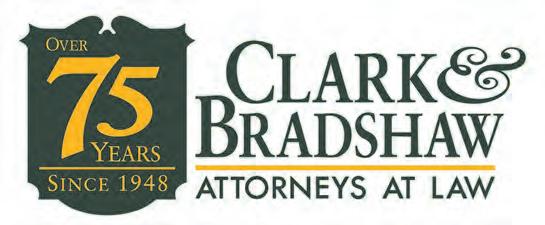
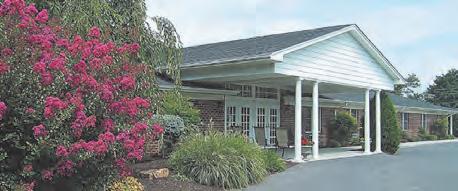
Is it time to review your estate plan? The statutory law of Virginia changes annually. Courts review and reinterpret law every day. You should review your estate plan to benefit from changes in the law. Whether you are planning for the distribution of assets at your death, naming someone to act for you during periods of incapacity, needing guidance through the murky waters of applying for Medicaid, or handling the estate of a lost loved one, we are here to help.
Set your mind at ease by planning for you and your loved ones at our convenient wheelchair-accessible downtown Harrisonburg location.
KAREN L. ROWELL, ESQ.
CERTIFIED ELDER LAW ATTORNEY
Email: krowell@clark-bradshaw .com



MATTHEW C. SUNDERLIN, ESQ.
CERTIFIED ELDER LAW ATTORNEY
Email: sunderlin@clark-bradshaw .com
CLARK & BRADSHAW, P.C.
92 North Liberty Street , Harrisonburg
Telephone: (540) 433-2601
Web: clark-bradshaw.com
We are a proud member of





Learning FROM PAGE A7
have the chance to recap their favorite moment from a recent trip to the Bunkers at Greenbrier or the Udvar-Hazy Museum, can continue the conversation they’d started during their weekly walking group — The Striders, catch up with the old friends they’ll be traveling to Europe with over the summer, or make plans to attend the wine social-hour later that evening with someone they just met at a lecture earlier that week.
The Tuesday described above could be any regular day at the James Madison University Lifelong Learning Institute—a membership-based organization dedicated to enriching the intellectual and social lives of adults aged 55+. By offering stimulating non-credit educational, social, and travel opportunities LLI believes that just because we’re all getting older, it doesn’t mean we have to stop learning and trying new things.
Founded in 1996 by faculty in the School of Social Work, the James Madison University Lifelong Learning Institute (JMU LLI) hosts classes taught by outstanding university faculty, guest lecturers, community partners, and fellow JMU LLI members. Classes are designed to broaden students’ minds through exposure to new topics on history,
literature, music and art, gardening, science, societal and global issues, and fitness and mindfulness. No homework! No tests! Just the chance to explore new topics, deepen your understanding of familiar ones, find a community of equally inquisitive adults, and stay energized and invigorated through your golden years.
JMU LLI is a membership-based organization where the first year of membership is free. After that it’s only $50. JMU LLI membership gives members access to all varied classes, lectures, events, workshops, members only social events,
and local and international trips but additional perks like discounts to the JMU Bookstore and free parking downtown during the semester.
We also have free events that are open and available to the public, which is a great way to see if JMU LLI might be a good fit for you.
Dr. Nicholas Schwartz, Dean of the School of Professional and Continuing Education where JMU LLI is housed, commented, “The thing I love most about LLI is that if you’re curious about it, we probably have a class, event, lecture, or trip that will help you explore it. From opera and pop music to container gardening, conversational Spanish to meditation, there is truly something for everyone to enjoy and explore!”
JMU LLI follows the academic calendar. Which means the Ice House won’t be quite as busy as that imagined Tuesday morning described above over the summer. But there will still be plenty going on! It’s the perfect time to dip your toe into some of our upcoming social events, become a member or renew your membership so you’re ready for the fall open house on Aug. 4. Class registration opens on Aug. 7 with classes staring Aug. 18.





Discover an energetic and creative lifestyle at our leading retirement community, where sophistication meets comfort. Delight in culinary excellence with our exquisite dining menu, crafted by accomplished chefs to entertain the palate. Immerse yourself in the fine and performing arts, featuring gallery exhibitions and live performances that inspire. Embrace the great outdoors with invigorating activities tailored for active seniors, from scenic nature walks to yoga on our certified organic farm.
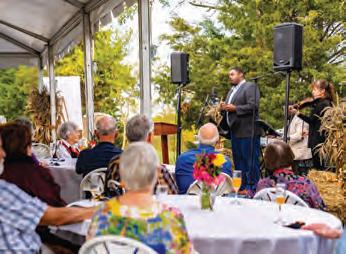
Experience a warm, welcoming atmosphere where neighbors become friends. Join us as we celebrate life and build a community that thrives on creativity, passion and joy.

To contribute information to the Living Longer, Living Well Community Calendar, please email Leigh-Anne Lees at leighanne@vpas.info. All events are free and hosted by Valley Program for Aging Services (VPAS) unless otherwise noted.
VPAS Cafes
VPAS Cafes provide attendees 60 years and older with lunch, along with a variety of life-enriching activities including: light exercise, educational or wellness programs, crafts, music, guest speakers, social engagement, and more. Register by calling 540-615-5341.
VPAS Harrisonburg Cafe
• First and third Mondays each month | 10 a.m. to noon| Price Rotary Senior Center, Harrisonburg
VPAS Timberville Cafe
• First and third Wednesdays each month l 10:30 a.m. to 12:30 p.m. l Plains District Community Center
VPAS Grottoes Cafe
• Second and fourth Wednesdays each month l 10 a.m. to noon l Grottoes Town Hall
VPAS Bridgewater Cafe
• Second and fourth Thursdays each month l 10 a.m. to noon l Bridgewater Retirement Community
VPAS Singers Glen Cafe
• First Thursdays each month l 10 a.m. to noon l Singers Glen Community Center
VPAS Fulks Run Cafe
• Second Thursdays each month l 10 a.m. to noon l Mt. Carmel Church of the United Brethren in Christ
Bergton Cafe
• July 31, 2025 l 10:30 a.m. to 12:30 p.m. l Bergton Community Recreation Center
Alzheimer’s Caregiver Support Group
• First Friday of the month | 10:30 a.m. | Community Mennonite Church, Harrisonburg
• Second Thursday of the month l 1 p.m. l Summit Square, Waynesboro Register: vpas.info/caregiver-support or call VPAS at 540-615-5341
Ongoing Caregiver Support Groups
• Fourth Tuesday of the month | 3 to 4 p.m. | Sunnyside Retirement Community, Harrisonburg
• Third Monday of the month l 3 to 4:30 p.m. l Bridgewater Retirement Community, Bridgewater
• Third Tuesday of the month l 2 to 3 p.m. l Aviva Baldwin Park, Staunton Register: vpas.info/caregiver-support or 540-615-5341
Virtual Caregiver Support Groups
• Mondays at 3:30 p.m. or Wednesdays at 10:30 a.m.
• Third Thursday of the month at 10:30 a.m. (Anticipatory Grief Support Group)
Register: vpas.info/caregiver-support or 540-615-5341
Memory Partners — A safe space for dementia care partners to attend together
• First Thursday of the month |10 to 11:30 a.m. | Massanutten Regional Library, Harrisonburg
Register: vpas.info/caregiver-dementia-support or call 540-615-5341
• Second Thursday of the month l 10 to 11:30 a.m. l VPAS Waynesboro Office, Waynesboro
Register: vpas.info/caregiver-dementia-support or call 540-615-5341
Virtual Dementia Tour
• June 10 l One hour tours available 10 a.m. to 5 p.m. l Massanutten Presbyterian Church, Penn Laird
Register: vpas.info/caregiver-dementia-support or call 540-615-5341
Grocery Store Tour: Healthy Eating Choices, Food Labels and Nutrition
Presented by Becky Gartner, Extension Agent, Family & Consumer Sciences, Virginia Cooperative Extension
• June 24 l 10 a.m. l Food Lion, 1021 Port Republic Road, Harrisonburg
Hosted by Sentara RMH Senior Services. Call 540-564-7001 to register.
Virginia Cooperative Extension is a partnership of Virginia Tech, Virginia State University, the U.S. Department of Agriculture, and local governments. Its programs and employment are open to all, regardless of age, color, disability, sex (including pregnancy), gender, gender identity, gender expression, genetic information, ethnicity or national origin, political affiliation, race, religion, sexual orientation, or military status, or any other basis protected by law.
Dealing with Dementia
• June 28 l 9:30 a.m. 2:30 p.m. (light lunch provided) l VPAS Office, Harrisonburg Register: vpas.info/caregiver-dementia-support or call 540-615-5341
Prepare to Care: Navigating a Dementia Diagnosis
• July 16 l 1 p.m. to 3 p.m. l Sentara RMH Medical Center, Harrisonburg Register: vpas.info/caregiver-dementia-support or call 540-615-5341
Pelvic Floor Therapy
Presented by Marielle Bertram, PT, DPT, OCS, PRPC, CSCS, Sentara RMH Outpatient Rehab Therapy
• Aug. 4 l 10 a.m. l Sentara RMH Medical Center at the Medical Offices building, Harrisonburg
Hosted by Sentara RMH Senior Services. Call 540-564-7001 to register.
Help with Hearing Loss
• Aug. 18 l 2 to 3 p.m. l Price Rotary Senior Center, Harrisonburg Register: vpas.info/aging-confidence-educational-opportunities or call 540-615-5341
Caring for the Caregiver
A three-part series
• Aug. 20, Sept. 24 and Oct. 22 l 2 to 3 p.m. l Bridgewater Retirement Community (Shenandoah Room and Blue Ridge Room on 10/22), Bridgewater Register: vpas.info/caregiver-dementia-support or call 540-615-5341
I’m Dead. Here’s the Deal — End of Life Planning
• Aug. 25 l 2:30 to 4 p.m. l Waynesboro Public Library, Waynesboro

Register: vpas.info/aging-confidence-educational-opportunities or call 540-942-1838
20 Ways to De-Clutter
• Aug. 28 l 2:30 to 4 p.m. l Waynesboro Public Library, Waynesboro Register: vpas.info/aging-confidence-educational-opportunities or call 540-942-1838
Sleep and Brain Health
Presented by Fouzia Siddiqui, MD, FAAN, Sentara RMH Neurology
• Sept. 16 l 1 p.m. l Sentara RMH Medical Offices Building, Harrisonburg
Hosted by Sentara RMH Senior Services. Call 540-564-7001 to register.
Best Foot Forward Falls Prevention Fair
• Sept. 23 l 11 a.m. to 2 p.m. l Valley Mall, Harrisonburg
For more information, call 540-615-5341.

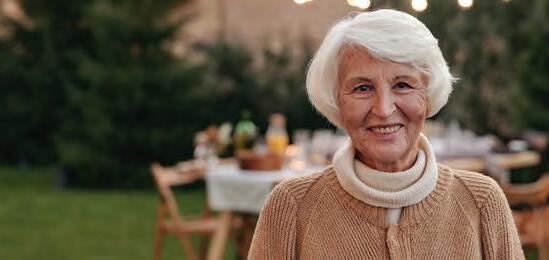





Bridgewater Retirement Community team member Amanda Harpine and resident Emil Lipscomb par ticipate in an OMA session together.
By KATHY GUISEWITE Caregiver Outreach Coordinator, VPAS
Have you heard about the amazing abstract arts program blazing through the valley? Or better yet, have you seen it? It’s called Opening Minds through Art (OMA), and it is so much more than splashing paint on a canvas. OMA is an internationally recognized abstract arts program designed for people living with dementia and other cognitive concerns Its creators are also recognizing the merit of this program for those who are socially isolated and in need of positive opportunities to engage with others.
OMA is based on the neuroscience of the brain. When we engage in art, whether it is observing it or participating in the creative process, we are lighting up numerous areas of the brain and enabling it to thrive. Like exercise for the body, art is exercise for the brain. For more information on the beautiful intersections between art and neuroscience and our overall well-being, check out the book: Your Brain on Art by Susan Magasman and Ivy Ross.
What OMA also teaches us is that relationships that are positively built upon person-centered philosophies, the practice of autonomy, and a healthy dose of play enliven volunteers and artists alike by unlocking doors of delight. So, OMA is also good for the heart and the spirit.
OMA is, indeed, a fine mixture of fun, education, and creativity. Each
art project comes with an art lesson that highlights famous abstract artists, the value of such work, and elements of various paintings that are replicated in OMA projects There is the signing and sharing of each person’s creation at the end of each session, and the titles the artists give their paintings are often as imaginative as the art itself.
Valley Program for Aging Services (VPAS) began offering OMA sessions about two years ago, and has regularly seen the benefits of drawing the community into this experience. Family caregivers are often invited to bring their loved one to OMA sessions while they join other VPAS staff for workshops and support groups that focus on caregiving.
Other times, VPAS has offered OMA sessions as a form of respite to caregivers, and they use that time for their own personal replenishment. In an astonished voice, a caregiver recently commented, “I never knew my husband liked art, and now look at what he does. I mean, I never would have guessed that this painting on the wall was his! And it’s so good for his mind. He has more to say to me now that he has in a long time.”
OMA is a magical opportunity that invites our community to see one another in ways that matter. For more information on becoming a volunteer or to participate as an artist, contact Kathy Guisewite at (540) 471-5633.




